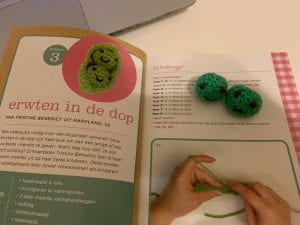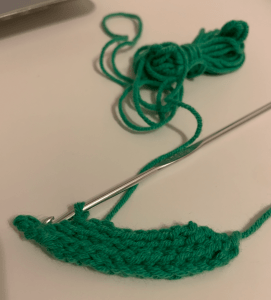Hello from isolation! While circuit breaker has proven to be a little lacking in the fun department, I’ve picked up a new skill (still needs working on): crochet! Many years ago I tried crocheting with my mum but it never really worked out, she was always the one who would be making the little creature we were supposed to be making and I was off doing something else. I never had the patience. Until now. I was inspired to start this new hobby for several reasons. The most important one is that I have an allergy to something unknown which causes me to run through tissue boxes faster than the average person. I’ve seen all the Kleenex tissue box designs by now and I wanted something a little more personal. So, this led me to want to crochet a sort of tissue box cover. Like this one (I hope the formatting works).
So far I’m nowhere close to this, but I’ve been taking my time and been trying to build up a solid base by learning the basic stitches, eventually a more complicated one, and then I might start the covers or do something else. I’d like to say that I’m a lot more patient this time around, mainly because it’s something that I want to do, so it’s sort of a relaxing activity to do whilst listening to music or a podcast. I think I’ve pretty much got comfortable with the chain stitch. Oh yes. I’m well aware this is one of the most basic stitches, but hey I’ve gotta start somewhere! Another thing I’m learning about is consistency. It’s extremely important to keep the tension the same if you want an even end product and it’s much easier to find the holes if it’s looser, but not too loose or else it’s just a mess of string.
Doing this has made me realise that I have a commitment issue when it comes to activities. I’ll have a brilliant(ish) idea and something that I’m really excited about, but if I take too long to start it or if I realise that results don’t pop out of nowhere, I lose my will and give up. By writing this, I’m hoping that I’m speaking/writing it into existence and that I’ll stick with it a little while longer because it could be a really satisfying little hobby to have. And I’m not limited to just tissue box covers. I could be unstoppable. I could make it my mission to fill the world with my Crochet Creations ™.
I hope these reflections are allowed to be informal.
So yeah! That’s what I’ve been doing. Before I make the tissue box cover I might actually take a detour and make a pea pod because from the many years ago when I did crochet, I had made (more like my mum) two peas but I never (she saw no point because I wasn’t doing it) finished making the pea pod. Here’s a picture of those guys and the to-be pea pod. There’s also a picture of me and me practising my chain stitch.
I’ve also just realised the instructions booklet for the peas in the pod is in Dutch so I suppose that could be another challenge although I have a friend called google translate who might be able to help me out. But I’ll try and read it by myself because we’re all about resilience and critical thinkers at UWC.
Thanks for reading and I’m just as surprised as you are that I could write this much about crochet.




